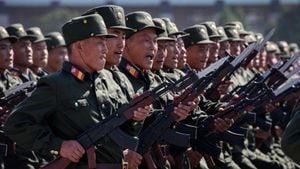Punjab Chief Minister Bhagwant Mann recently took center stage at the ‘Punjab Vision 2047’ conclave held at Panjab University, where he addressed the pressing issue of air pollution. With the worsening air quality affecting not only Punjab but also neighboring states like Delhi and Haryana, Mann emphasized the importance of collaborative efforts rather than engaging in blame-shifting. "There should be no blame game over the pollution issue," he remarked, highlighting the necessity for all states involved to come together to find effective solutions.
During his address, Mann also directed his comments toward Pakistani Punjab Chief Minister Maryam Nawaz, who had previously suggested via social media and public statements, insinuations of Punjab's contribution to the alarming pollution levels, especially affecting Lahore. Mann quipped, "It seems Punjab's smoke is traveling round and round,” effectively using humor to diffuse tensions. He added, "Maryam wants to write me a letter. She claimed the polluted smoke went to Lahore from our Punjab. It seems you're blaming us from all sides,” referencing the rhetoric coming from across the border.
Maryam Nawaz's remarks came at a time when pollution levels were surging due to seasonal stubble burning, primarily undertaken by farmers to clear fields post-harvest. This practice has consistently garnered criticism, especially from Delhi, which often bears the brunt of smog during autumn when air quality takes a significant downturn. Mann took this opportunity to lighten the mood, stating, “I say let her also make us unhappy,” challenging the narrative of blame placed upon Punjab.
He used the opportunity not only to advocate for the need for cooperative dialogue around environmental issues but also to subtly poke fun at the irony of how the problem of air quality is nationally shared, not solely confined to any one state. "People here [in Delhi] say pollution originates from Punjab, but it's also the problem of Madhya Pradesh, Uttar Pradesh, and Haryana. Its solution has to be found by sitting together," remarked Mann, who is advocating for more comprehensive strategies to address this multifaceted issue.
With the stubble burning issue being criticized so heavily, it’s worth noting why farmers resort to this method. After the paddy harvest, the time available to sow Rabi crops, such as wheat, gets very tight. To make way for the next crop, many farmers set fire to the leftover paddy straw, resulting in thick smoke and increased particulate matter levels, directly impacting air quality not only within Punjab but extending to Delhi-NCR as well. Mann stressed the need for crop diversification to help alleviate this burden.
"We want crop diversification. What we get per acre from paddy, we should get the same from other crops like maize, bajra, and masoor daal. Paddy is not even part of our staple diet," the Chief Minister stated, pushing for policies to assist farmers financially if they transition to alternative crops. He pointed out the importance of ensuring farmers do not face financial losses for making such shifts, implying the need for government support and incentives.
Meanwhile, as smog enveloped much of North India, various health organizations and government bodies have raised alarms. Pollutants reached alarming levels, with the air quality index (AQI) breaching ‘severe’ categories, prompting warnings about health risks associated with prolonged exposure to such environments. It is clear this brings short-term and long-term health consequences, predominantly respiratory conditions among vulnerable populations.
Given these dynamics, Mann’s remarks resonate with broader conversations about environmental stewardship and regional cooperation. By encouraging discussions instead of hostility between neighboring states, Punjab's Chief Minister is advocating for solutions rooted not just in political rhetoric but also actionable change. His lighthearted jibes at Maryam Nawaz contain undertones of frustration at the persistent blame directed at Punjab, all the more evident as scientists and environmental experts continue to grapple with the ramifications of agricultural practices on air quality.
The winter months will continue to pose challenges as stagnant air tends to trap pollutants, highlighting the communal nature of this environmental crisis. Building relationships among state leaders and fostering collaboration through shared responsibility may be the pathway forward to tackle the pressing issues related to agriculture and pollution.
Moving forward, it seems clear there needs to be shared strategies implemented across states to address pollution comprehensively. Mann’s engagement with Maryam Nawaz opens the door for dialogues beyond playful banter—propelling discussions on policy making, agricultural innovation, and public health to the forefront. The fate of millions rests on the ability of politicians and policymakers to collectively navigate these issues, ensuring the air grows cleaner not just for Punjab, but for everyone affected across the region.



